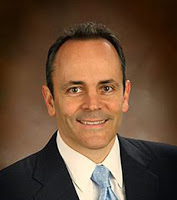Bevin gives much lower estimate for ending Kynect, says Medicaid expansion depends on agreement with federal officials

 |
| Gov. Matt Bevin (Photo via www.bizjournals.com) |
Gov. Matt Bevin said it will only cost the state “one to two million dollars at the most” to dismantle Kynect, the state’s online health insurance marketplace, instead of $23 million, which he said is a “made up” number.
Bevin made his comments in an interview with Terry Meiners on WHAS Radio on the afternoon of Jan. 13.
The $23 million estimate came from an Aug. 27 meeting of the legislature’s Budget Review Subcommittee on Human Resources, where Kynect Executive Director Carrie Banahan said in a presentation, “Vendor projections indicate the IT work alone would take 9 months to complete at a cost of $23 million.”
Bevin said the $23 million estimate “is just a made up number that someone made up and people continue to run with.”
Bevin notified federal officials Dec. 30 that Kentucky plans to shut down Kynect, which he says is redundant because there is a federal exchange and that isn’t fair because all Kentuckians are paying for something that relatively few use. The federal exchange charges a 3.5 percent fee on policies it sells; Kynect is funded by a 1 percent assessment on all health-insurance policies in the state.
“It will cost for those individuals a little more for their policy in terms of the premium they pay, but frankly it’s a few tens of thousands of people out of 4.4 million,” Bevin said. “Why should 100 percent of us pay for something that less than 2 percent of us are using? We are going to stop doing it. It is redundant.”
Advocates say using the federal exchange will be more inconvenient for Kentuckians and insurance companies, and leave Kentucky short of the people needed to help people use the system.
Kynect was initially funded by $283 million in federal funding. Bevin said Kentuckians will enroll for health coverage through the federal exchange during the November 2016 open enrollment and “then it will be done.”
Kynect has not released its 2016 enrollment numbers, but last year about 500,000 Kentuckians had coverage through it, about 400,000 on Medicaid. Enrollment for subsidized private insurance ends Jan. 31.
When Meiners noted that Bevin wasn’t as adverse to Medicaid expansion as he was near the beginning of his campaign, Bevin said, “I am very adverse to us doing it under the current structure because we can’t afford it,” he said. “We were left with a $128 million shortfall in 2016 alone.”
He noted that the shortfall was for traditional Medicaid, not expanded Medicaid, and asked how the state can afford to pay for expanded Medicaid when it is over budget on traditional Medicaid, “unless it’s changed dramatically for both.”
The Medicaid expansion includes those who have incomes up to 138 percent of the federal poverty level. The federal government is paying the entire cost of it through this year; in 2017 states will pay 5 percent, rising in annual steps to the law’s limit of 10 percent in 2020.
Bevin has appointed Mark Birdwhistell, a University of Kentucky health executive and former state health secretary, to help him design a new Medicaid program for the state. He noted that he will be working with the federal Centers for Medicare and Medicaid Services over the next six months to determine if they can “work something out.”
“If we do not, we will have no choice but to un-expand,” he said. “And that is what we have the ability to do; it’s what we may be forced to do; it’s what I would rather not do; and it’s what we are going to work toward not doing if at all possible.”